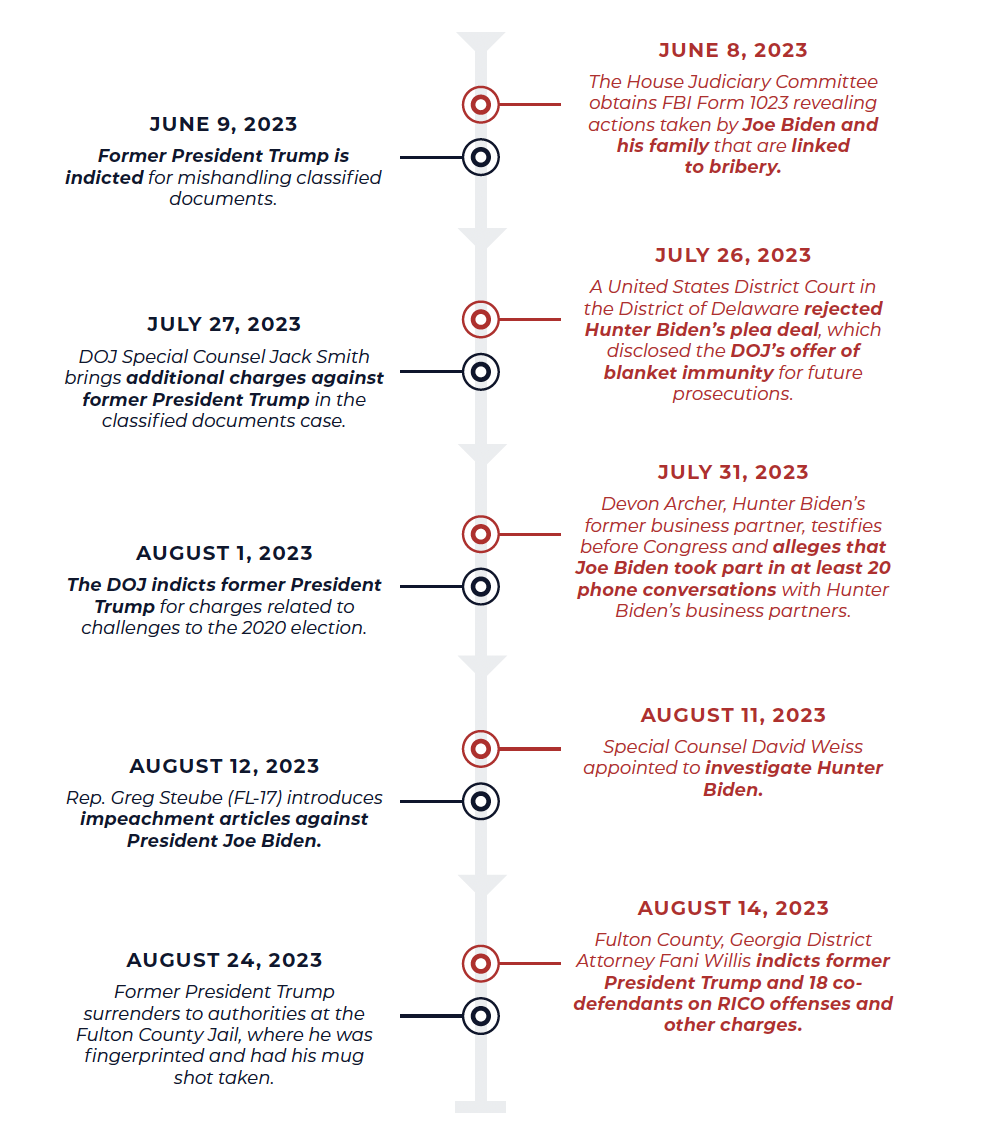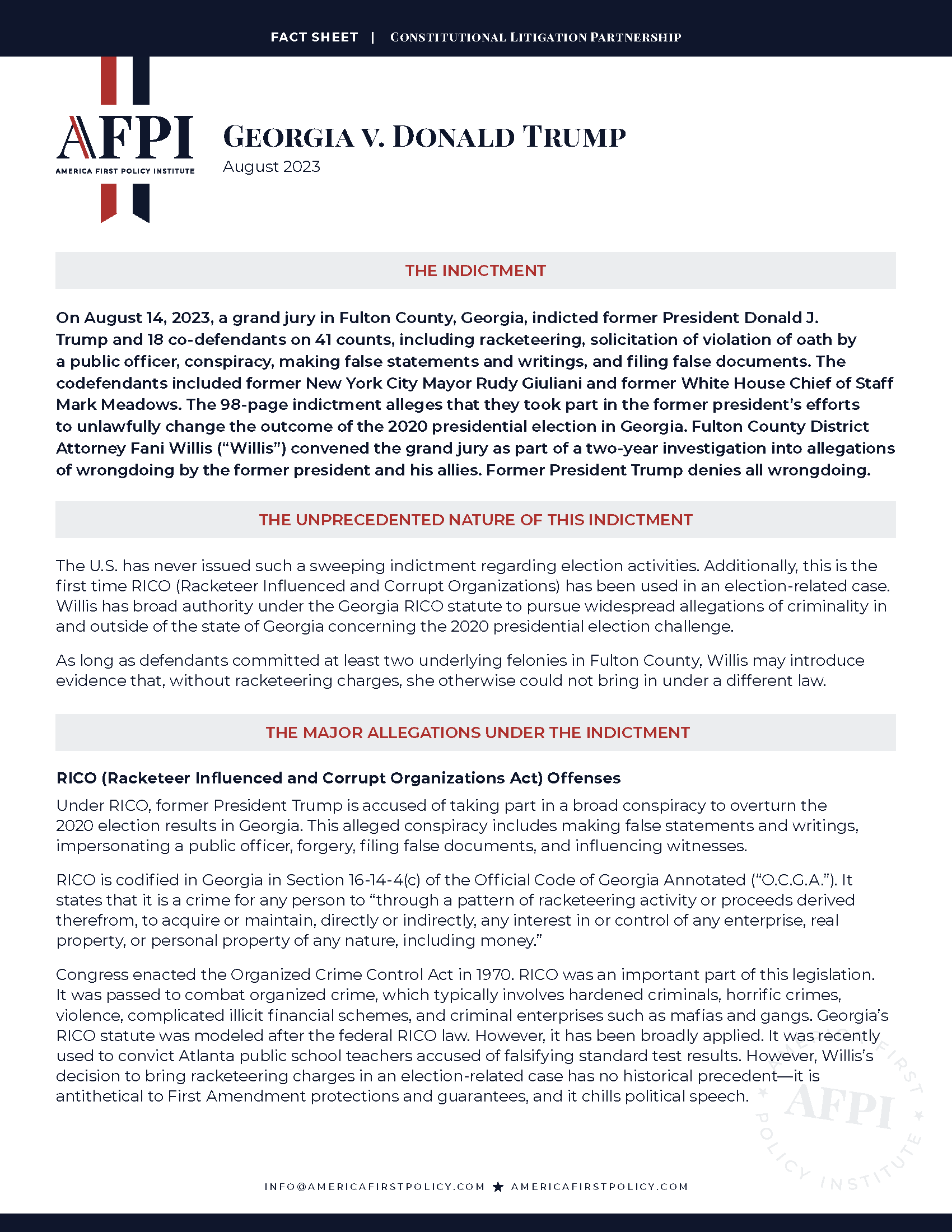Georgia v. Donald Trump
THE INDICTMENT
On August 14, 2023, a grand jury in Fulton County, Georgia, indicted former President Donald J. Trump and 18 co-defendants on 41 counts, including racketeering, solicitation of violation of oath by a public officer, conspiracy, making false statements and writings, and filing false documents. The codefendants included former New York City Mayor Rudy Giuliani and former White House Chief of Staff Mark Meadows. The 98-page indictment alleges that they took part in the former president’s efforts to unlawfully change the outcome of the 2020 presidential election in Georgia. Fulton County District Attorney Fani Willis (“Willis”) convened the grand jury as part of a two-year investigation into allegations of wrongdoing by the former president and his allies. Former President Trump denies all wrongdoing.
THE UNPRECEDENTED NATURE OF THIS INDICTMENT
The U.S. has never issued such a sweeping indictment regarding election activities. Additionally, this is the first time RICO (Racketeer Influenced and Corrupt Organizations) has been used in an election-related case. Willis has broad authority under the Georgia RICO statute to pursue widespread allegations of criminality in and outside of the state of Georgia concerning the 2020 presidential election challenge.
As long as defendants committed at least two underlying felonies in Fulton County, Willis may introduce evidence that, without racketeering charges, she otherwise could not bring in under a different law.
THE MAJOR ALLEGATIONS UNDER THE INDICTMENT
RICO (Racketeer Influenced and Corrupt Organizations Act) Offenses
Under RICO, former President Trump is accused of taking part in a broad conspiracy to overturn the 2020 election results in Georgia. This alleged conspiracy includes making false statements and writings, impersonating a public officer, forgery, filing false documents, and influencing witnesses.
RICO is codified in Georgia in Section 16-14-4(c) of the Official Code of Georgia Annotated (“O.C.G.A.”). It states that it is a crime for any person to “through a pattern of racketeering activity or proceeds derived therefrom, to acquire or maintain, directly or indirectly, any interest in or control of any enterprise, real property, or personal property of any nature, including money.”
Congress enacted the Organized Crime Control Act in 1970. RICO was an important part of this legislation. It was passed to combat organized crime, which typically involves hardened criminals, horrific crimes, violence, complicated illicit financial schemes, and criminal enterprises such as mafias and gangs. Georgia’s RICO statute was modeled after the federal RICO law. However, it has been broadly applied. It was recently used to convict Atlanta public school teachers accused of falsifying standard test results. However, Willis’s decision to bring racketeering charges in an election-related case has no historical precedent—it is antithetical to First Amendment protections and guarantees, and it chills political speech.
Solicitation of a Violation of Oath by a Public Officer
The State of Georgia has also charged former President Trump with solicitation of a violation of oath by a public officer. This law is codified in the O.C.G.A. §§ 16-4-7 & 16-10-1, and it involves asking someone to commit a crime. In this case, former President Trump allegedly solicited Georgia Secretary of State Brad Raffensperger (“Raffensperger”) to violate his oath of office on January 2, 2021, by telling him that he needed and was looking for more than 11,000 votes to flip Georgia’s results in the 2020 election.
Making False Statements and Writings
Georgia has also charged the defendants with making false statements and writings as part of this alleged conspiracy. The law regarding false statements is codified in the O.C.G.A. § 16-10-20. It makes it illegal for an individual to knowingly and willfully make a false, fictitious, or fraudulent statement or representation to officials. Former President Trump is accused of making false statements and writings including, but not limited to:
- Making a false statement and representation to the Secretary of State, Brad Raffensperger, that a greater number of irregular votes had been cast than he needed to change the Georgia election results; and
- Telling public officials that thousands of dead people voted in Georgia’s 2020 election; that election workers illegally tampered with ballots; and that 250,000-300,000 ballots were dumped into Georgia’s voter rolls.
THE STAKES: WHAT PENALTIES COULD TRUMP BE FACING IF FOUND GUILTY?
- RICO state charges carry a jail sentence of up to 20 years and/or a fine of up to $25,000 or three times the amount gained through the racketeering. Penalties may also be levied against former President Trump and others for the underlying crimes themselves. Probation is not available in RICO cases.
- Georgia’s RICO statute, arguably, is not subject to a presidential pardon. In Georgia, former President Trump and his co-defendants would be required to go before a five-member state board to seek a pardon. They would also be ineligible for a pardon for up to five years after their indictment, conviction and/or completed sentence.
IS THIS A CASE OF SELECTIVE PROSECUTION?
Alina Habba, Trump’s attorney, argues that Trump’s efforts to overturn election results was no different than Democrats, like Hillary Clinton, calling him an “illegitimate president.” Jonathan Turley, a constitutional scholar and law school professor called this an excessive, dangerous, and troubling indictment and added that “Trump had a right to raise concerns about the election.”
Additionally, Mike Davis, founder and president of the Article III Project, said that “like [Special Counsel] Jack Smith’s second Trump indictment, Fani Willis indicted Trump for the non-crimes of objecting to a presidential election (allowed by the Electoral Count Act of 1887) and twisting political arms (allowed by the First Amendment). Furthermore, Alan Dershowitz, legal scholar and the former legal counsel for former Vice President Al Gore, says Gore’s team did “the same thing” that former President Trump has been accused of doing in this case.
THE TIMING OF THIS INDICTMENT
During the past two months, the government has announced indictments and additional charges againstformer President Trump just days after new revelations in the ongoing investigation into the Biden family’s business dealings. The timeline shown below shows the sequence of these events.

This timeline is dubious, and it cultivates the belief held by nearly 80 percent of American voters that “there are two tiers of justice: one set of laws for politicians and Washington D.C. insiders vs one set of laws for everyday Americans.” See Tristan Justice, 4 in 5 Americans See Two-Tiered Justice System: Poll, August 9, 2022, available at https://thefederalist.com/2022....
